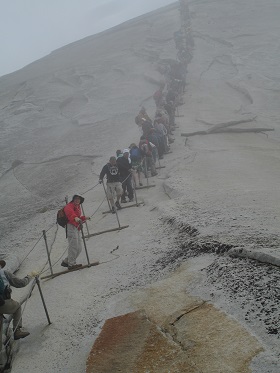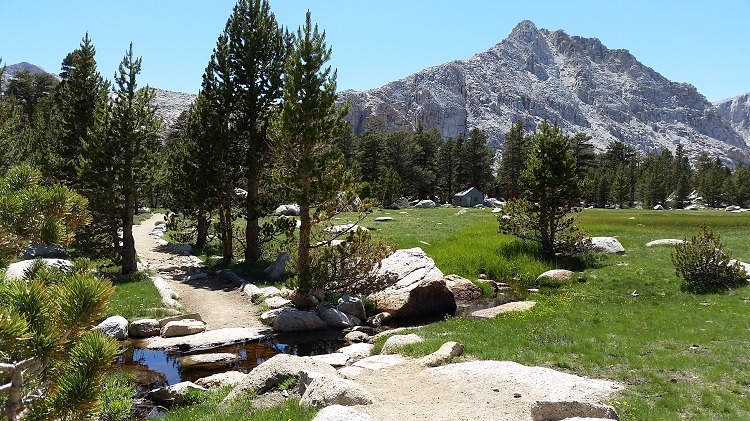I enjoy hiking above the 10,000-foot level where the colors are vivid and the air is crystal clear. To see these beautiful sights in the Sierras means hiking 13, 16, and even 20+ miles roundtrip in a 10 to 14-hour day. I’ve learned there are similarities between caregiving and backpacking.
Don’t take on more than you can handle.
After hiking in the Sierras, the Bishop area, Yosemite and in the San Gabriel mountains, I pack enough for the day’s hike plus a little more for an emergency.
One of our hiking buddies told me about a fellow hiker to Mt. Whitney. She was a fit petite woman, who did weight training. She didn’t want to use a portable water purifier, so she carried nearly two gallons of water. Over an hour into the hike, the 15 pounds of water along with everything else in her pack became too much to bear. She had to leave some of the water behind.
 I discovered I eat very little during long and strenuous hikes. I used to pack a lot of food figuring I needed to supplement all those calories I was burning. But, it takes energy to hike and to digest food. So, it’s best to nibble during a 10 to 12-hour 8-mile hike and a nearly 5,000-foot elevation change to the top of Half-Dome in Yosemite. A few almonds, an ounce of cheese, with a protein drink and water is all I need while hiking up. Once on top, a half-peanut butter-and-honey sandwich, half an apple, and coconut water is enough while I rest. For the trip down, some beef jerky, a few crackers and a small orange does the trick with some water. Once, I’m settled in Curry Village, all bets are off. Pizza!
I discovered I eat very little during long and strenuous hikes. I used to pack a lot of food figuring I needed to supplement all those calories I was burning. But, it takes energy to hike and to digest food. So, it’s best to nibble during a 10 to 12-hour 8-mile hike and a nearly 5,000-foot elevation change to the top of Half-Dome in Yosemite. A few almonds, an ounce of cheese, with a protein drink and water is all I need while hiking up. Once on top, a half-peanut butter-and-honey sandwich, half an apple, and coconut water is enough while I rest. For the trip down, some beef jerky, a few crackers and a small orange does the trick with some water. Once, I’m settled in Curry Village, all bets are off. Pizza!
These long hikes hurt my knees and back. Even a lighter backpack feels too heavy with swords stabbing my back. I curse my stupidity at deciding to do this long hike as my knees ache with each step. Does this sound like caregiving? I try to cope by taking off the pack and carrying it in one hand and then the other. Each arm grows weary, so I strap it back on. Nature’s beauty grows cloudy in the midst of my acute pain.
Help one another.
Sometimes, hiking buddies will offer to help one another. We have to be careful, because we’re all tired and sore. Helping another beyond our own limits will lead to bigger problems. I’ll usually ask for little things that make a big difference for me but take little energy from another hiker. “Will you please hold my hand or forearm and guide me downhill as I walk backwards to relieve the force on my knees?”
The same is true when we commit to caregiving. If we exceed our limits we’ll place ourselves in danger. This is why I haven’t hiked up Half Dome, recently. I still enjoy the 12-mile round trip hike between Horseshoe Meadows and Cottonwood Lakes in the Sierras.
Little things can make a big difference. Instead of having to remove your backpack each time you want to take a drink from your hard-to-reach water bottle, someone can easily retrieve it for you. It takes little effort and makes your life so much easier. When two people try to do individually the same thing for themselves, the task grows much harder and takes longer. If they each help one another, it goes faster, is easier, and over time, strengthens their relationship.
Breathe deeply and drink enough water.
Finally, while caregiving, remember to stop and take a deep breath and exhale fully. During the middle of an intense workday, if I can’t get out for a walk, I’ll go outside and take a deep breath. I’ll exhale fully and then force out the last bit of air to clear the toxins. I repeat this cycle two more times. I find it makes a big difference in how I approach my work when I return. And it takes about a minute.
Also, drink plenty of water. Water is the fluid of life. When we’re dehydrated, we become lethargic and don’t function well. I try to drink half my body weight in ounces. In other words, at less than 120 pounds, I’ll drink at least 60 ounces of water.
We owe it to ourselves, our hiking buddies, and care recipients, to take care of ourselves.








